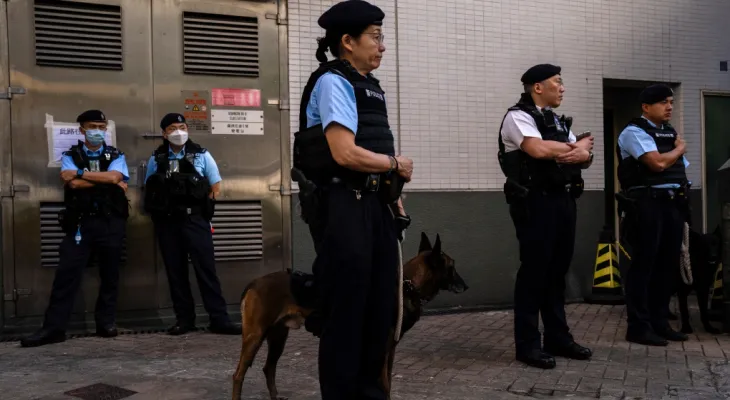Search here
Newspaper
Search here

Arab Canada News
News

Published: December 10, 2023
Residents headed to the polls today, Sunday, in the first local council elections in Hong Kong since the implementation of the electoral reform directed by Beijing, where "patriots" who manage the city effectively excluded all pro-democracy candidates.
Voter turnout is expected to be much lower than in the last elections, held at the peak of the anti-government protests in 2019, with some pro-democracy voters, upset by the radical rule changes including the removal of most directly elected seats, turning their backs on the polls.
Members of the Hong Kong Socialist Democratic Association, one of the remaining pro-democracy parties in the city, had planned to organize a small protest to express their displeasure at the changes in the electoral rules, and the group said its members were arrested after being pursued from their homes.
The police said they arrested three people on suspicion of intending to incite others to disrupt the elections, but did not mention names. Authorities also arrested three other people on charges of inciting others to cast invalid votes on Sunday.
The final turnout rate will be a measure of public sentiment towards the "patriots-only" system, the new political system under the crackdown campaign launched by the Hong Kong government on opponents following the 2019 protests — the most concerted challenge to Beijing since the former British colony returned to China’s rule in 1997.
China promised that the semi-autonomous region would retain its Western-style freedoms for 50 years under the "one country, two systems" principle. However, this promise has become increasingly fragile after Beijing imposed the national security law which led to the arrest and silencing of many pro-democracy activists.
In 2021, the city amended its electoral laws for its legislature, greatly reducing the public’s ability to vote and increasing the number of Beijing-supporting legislators who make decisions for the city. Following the changes, voter turnout dropped from 58 percent to 30 percent in that year’s legislative elections.
District councils, primarily responsible for municipal issues such as organizing construction projects and public amenities, were the last major political bodies mostly chosen by the public.
The election held four years ago was symbolically important in the anti-government movement, with a record turnout rate of 71 percent. The landslide victory of the pro-democracy camp was a rebuke to the government’s handling of the 2019 protests.
But an amendment passed in July reduced the percentage of directly elected seats from about 90 percent to about 20 percent — a level even lower than when the councils were first introduced in the 1980s under British rule. The new nomination requirement effectively excluded pro-democracy candidates from the election for the first time in about four decades. Some pro-government politicians also faced difficulties securing enough nominations to qualify.
At a polling center in the Wong Tai Sin residential area on Sunday morning, about 30 people stood in line outside waiting for the doors to open at 8:30 am. Over 10,000 police officers were deployed across the city to ensure the election was conducted safely and orderly.
Housewife Ivy Sze (37 years old) said the reform did not shake her confidence in the electoral system. However, she said she felt the number of voters in the morning was lower than in previous elections.
She said while holding a government thank-you card, part of what officials described as a "warm" gesture for those who voted: "There was a long queue outside."
But university student Timothy Cheung (21 years old) decided not to vote after the rule changes, saying his peers also intended to abstain from voting.
He said, "There’s no point in voting even if I cast my vote. All the candidates lean toward one side," referring to their pro-government backgrounds.
The polls were initially scheduled to close at 10:30 pm (1430 GMT) but were extended for an hour and a half due to the failure of the electronic poll registration system. According to the latest official data, 24.5 percent of the city’s 4.3 million registered voters cast their ballots after the polling centers were open for 11 hours, down from 60.4 percent in 2019. Final turnout figures have not yet been announced.
Many politicians said the glitch would affect their chances of winning as some residents gave up on voting before authorities implemented their contingency plan. After the polling centers closed, Hong Kong leader John Lee said on Monday he was concerned about the incident and asked the Electoral Affairs Commission to form a task force to investigate the matter.
Government officials downplayed the importance of turnout rates as a measure of the reform’s success. On Friday, Secretary for Constitutional and Mainland Affairs, Erick Tsang, said abstaining from voting did not necessarily mean opposition to the elections, adding that non-participation could be for other reasons.
David Lok, chairman of the Electoral Affairs Commission, said on Sunday it was not "appropriate" to directly compare the rate with the 2019 elections because the voting system, council composition, and electorate were different in the two polls.
Nevertheless, Lee and his administration intensified their efforts to mobilize support for the elections. The government held various promotional activities, including carnivals, an open-air concert, and free entry to some museums.
The city’s major airline, Cathay Pacific, also offered discounted fares for travelers returning from mainland China to Hong Kong, saying it wanted to help residents "actively participate" in the polls.
Lee said earlier this month that civil servants bear the responsibility to support the government in implementing its policies, urging them to be role models in voting. He and his wife went to a polling center to vote on Sunday morning, describing the election as the "final piece of the puzzle" to implementing the principle of "patriots" governing the city.
He said, "Elected council members will serve Hong Kong’s interests. They will not betray Hong Kong’s interests and the country’s interests."
Comments